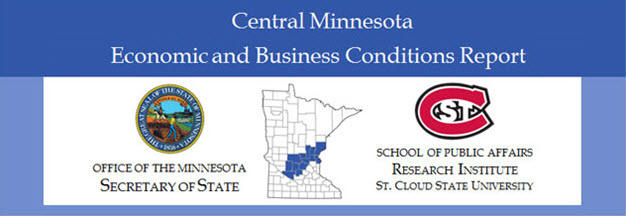Publication Title
Central Minnesota Regional Economic and Business Conditions Reports
Document Type
Research Study
Publication Date
6-9-2019
Financial Year
2018
Abstract
Economic growth is expected to slow in the Central Minnesota planning area over the next several months according to predictions of the Central Minnesota Index of Leading Economic Indicators (LEI). The leading index fell by 6.62 points in the most recent period, with only one component producing a positive reading. Increased national durable goods orders was the only LEI component to produce a favorable outlook in the fourth quarter. The remaining index components--St. Cloud area residential building permits, the Minnesota Business Conditions Index, new regional filings of incorporation, and initial claims for unemployment insurance all helped drag down the local index.
There were 1,401 new business filings with the Office of the Minnesota Secretary of State in Central Minnesota in the fourth quarter of 2018 — representing a 5.3 percent increase from one year ago. 160 new regional business incorporations were tallied in the fourth quarter, 16.8 percent more than their year ago level. New limited liability company (LLC) filings in Central Minnesota increased 3.3 percent relative to the fourth quarter of 2017. New assumed names totaled 332 over the recent quarter—an increase of 1.8 percent compared to the same period in 2017. Current quarter new filings for Central Minnesota non-profit were 36.8 percent higher than one year ago.
Sixty-one percent of new business filers in the Central Minnesota planning area completed the voluntary Minnesota Business Snapshot (MBS) survey in the fourth quarter. Results of this voluntary survey indicate that 6.5 percent of new filers come from communities of color. Approximately 7.1 percent of new filings were made by military veterans. About 2 percent of new filers come from the disability community and 3.8 percent of new filings were made by the immigrant community. Nearly forty percent of new business filings in Central Minnesota in the fourth quarter were initiated by women. MBS results also show that most new business filers in Central Minnesota have between 0 and $10,000 in annual gross revenues (although 99 new filers have revenues in excess of $50,000). The most popular industries for new businesses in Central Minnesota are construction, retail trade, real estate/rental/leasing, professional/scientific/technical, and other services. Employment levels at most new firms are between 0 and 5 workers, and 43.8 percent of those starting a new business consider this a part-time activity.
Central Minnesota employment was 1.4 percent higher in December 2018 than it was one year earlier and the December regional unemployment rate was 3.8%--slightly lower than one year ago. Initial claims for unemployment insurance were 0.6 percent higher in December than they were in the same month last year. The Central Minnesota labor force rose by 1.2 percent and average weekly wages rose by 3.7 percent over the past year. Bankruptcies continue to rise in Central Minnesota.
Economic performance in the St. Cloud area was mixed. Most components of a future outlook survey of St. Cloud area business leaders conducted quarterly by St. Cloud State University were weaker than one year earlier. Increases in overall new business filings in the St. Cloud area were flat over the past twelve months. Average hourly earnings and hours worked increased, but the relative cost of living in St. Cloud rose. Employment expanded, the unemployment rate fell, initial jobless claims were lower, the labor force increased, and median home sales prices were higher.
Recommended Citation
Banaian, King and MacDonald, Richard, "Central Minnesota Economic and Business Conditions Report Fourth Quarter 2018" (2019). Central Minnesota Economic and Business Conditions Report. 19.
https://repository.stcloudstate.edu/qebcr_c_mn/19




